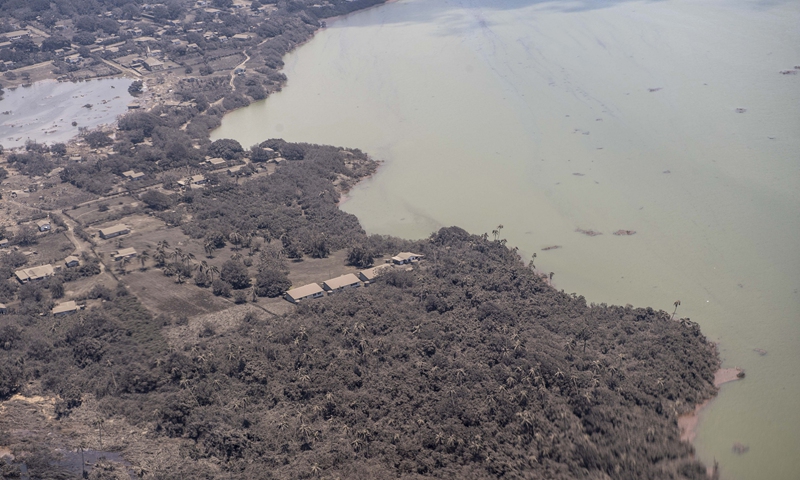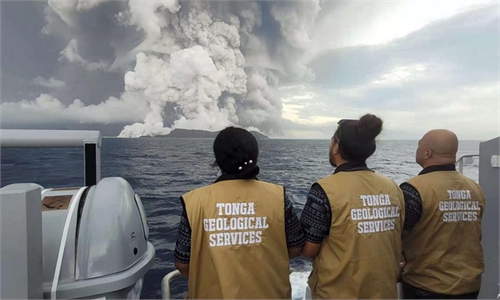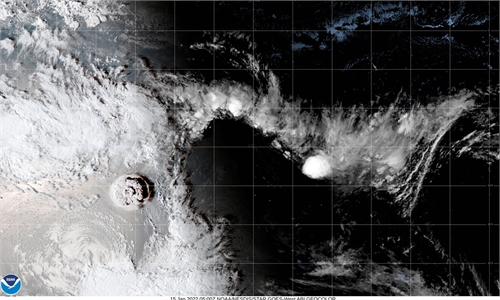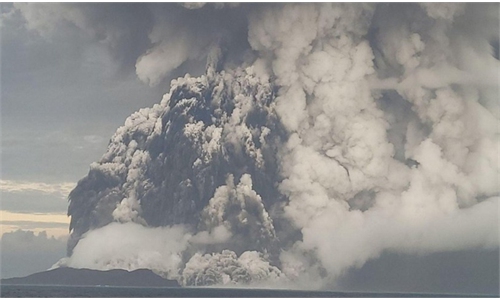Tonga suffers from wide damage to houses, water: local sources
Island nation, neighboring Fiji may face acid rain for months

View of Nomuka, Tonga, taken on January 17, 2022. Photo: CFP
Five days after the volcanic eruption, Tonga remains largely beyond contact with the outside world except for satellite phone services. Falling volcanic ash has contaminated local fresh water, which relies on rainwater collection tanks and the tsunami triggered by the eruption also damaged residents' houses, the Global Times learned from embassy and local sources on Wednesday.
Some scientists warned that acid rain may fall on the island nation for days or months, causing severe damage to the ecology and threatening human lives, and neighboring countries including Fiji may also get acid rain.
On Wednesday, Chinese President Xi Jinping sent a message of condolence to King Tupou VI of Tonga over the volcanic eruption. Xi said China is ready to provide support to Tonga within its capacity to help the Tongan people overcome the disaster and rebuild their homes.
The Embassy of the Kingdom of Tonga in China told the Global Times on Wednesday that tsunami-hit Tonga remained largely uncontactable, and the ambassador was unable to contact his family in Tonga. The embassy could not provide further details about damage or injuries.
The government of Tonga said in a statement released on Tuesday that there were three confirmed fatalities and a number of injuries reported, and government efforts have been made to ensure the continuity of the supply of safe drinking water since water supplies have been seriously affected by the volcanic ash, according to a press release the embassy sent to the Global Times on Wednesday.
Challenges to sea and air transportation remain due to damage sustained by wharves and ash that is covering runways. Domestic and international flights have been deferred until further notice as the airports undergo a clean-up, the statement said.
Zhao Yongming, manager of the Tonga company of China Civil Engineering Construction Corp, told the Global Times on Wednesday through a satellite phone that the company immediately transferred its personnel and materials to higher ground after it received a warning from the Chinese Embassy in Tonga, and the eruption did not cause any casualties at the company.
Zhao said the company had sufficient fresh water and other supplies for all 38 people of the company for more than three months, and they contacted the Chinese headquarters through satellite phones every day to update their situations.
But local residents who live near the shore and whose houses are made of wood were hit hard by the volcanic eruption, and their fresh water was contaminated as volcanic ash covered their rainwater collection tanks, Zhao said. People can buy bottled drinking water from local stores, but household water other than drinking water is affected.
So far, no international rescue organizations have been able to arrive in the island nation for assistance, and the company, while taking measures to protect its staff, has provided accommodations for four local residents, Zhao said.
He said the Chinese Embassy in Tonga has been keeping them updated amid the network breakdown.
According to Zhao, the company did not plan to evacuate its staff from the country, and the Chinese staff will stay sharp, keep in touch with the Chinese embassy and increase reserves to ensure they could transfer promptly in case of a subsequent disaster. Zhao said the company will resume work once the situation gets more stable.
A day ago, Cao Xiaolin, China's Ambassador to Tonga, said that over 1,000 Chinese citizens living and working on Tonga's main island are safe, and the embassy asked the Tongan government to assist in checking the situation of Chinese citizens on outlying islands and providing assistance as communications between Tonga and the outside world have been interrupted.
Volcanic ash is still in the air, which can harm people's respiratory systems. The public has been asked to avoid going out and wear masks when doing so, Cao said.
The China National Satellite Meteorological Center has been closely tracking the volcanic eruption and its impact with satellite data.
Zhu Lin, an expert with the center under the China Meteorological Administration, told the Global Times on Wednesday that water takes up about 60-90 percent of the ash cloud formed during a volcanic eruption, and acid gases such as sulfur dioxide follow water in the mix, which will oxidize within a few weeks and form acidic aerosol particles.
In addition to a large number of acidic gases, the volcanic ash cloud also contains a large amount of pyroclastic material brought by the eruption of igneous rocks. It takes days or even weeks for a large amount of pyroclastic, mixed with aerosols, to dissipate with atmospheric motion, which has a profound impact on the climate, Zhu noted.
Based on monitoring data gathered by China's Fengyun satellites, as of 8 am on Tuesday, the ash cloud from the eruption had spread to the northwest of Australia and continued westward.
Yu Wenchao, assistant professor at the School of Earth Sciences with the China University of Geosciences, told the Global Times on Wednesday that the volcanic ash containing aluminosilicate could contain the growth of plants and crops after it fell on them, and also jeopardize the safety of drinking water as it fell into the rainwater.
The large volume of sulfur dioxide and nitrogen oxide released during the volcanic eruption is also likely to form acid rain over the island nation, which might kill some plants and corrode construction materials of buildings, Yu said.
It is not clear how long the acid rain may last, but Yu said it might last days to months and may also fall in nearby Island nations such as Fiji.
Fiji on Wednesday said that it recorded slightly acidic rainfall on Monday and Tuesday, and the Ministry for Agriculture Waterways and Environment in Fiji released guidance to the public, urging it to avoid going out in the rain and covering household water sources to avoid contamination, according to a statement that a Chinese national who lives in Fiji sent to the Global Times on Wednesday.
A Tongan national who lives in Fiji and goes by Bubble on Twitter told the Global Times that the Lau Group of Islands in Fiji situated near Tonga experienced tidal waves or tsunami triggered by the underwater volcanic eruption and parts of Fiji could still see ash clouds.
Bubble, who has lost contact with his family in Tonga since the eruption, said that people in Fiji on Wednesday were urged to boil drinking water "just to be safe."



